Each character entry below contains a ≤1 MB QuickTime movie of the character being painted with a brush, created by Prof. Saeko Komori of Chubu University. Please see the JP Net Kanji Project for more details.
In the following definitions, on (Chinese-based) readings are represented by katakana, and by capital romaji letters; kun (native Japanese-based) readings are represented by hiragana, and by lower-case romaji letters. This is a common dictionary convention, and does not have any bearing on meaning.
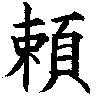
Video: Writing and pronunciation
Printed form: 頼
Readings: たの (む) tano
Meaning: to request; to rely
Mnemonic:
束 bundle of sticks and 頁 big head. Before you ask someone for a favor, you should put your thoughts together.
Usage Examples:
頼む (たのむ) request
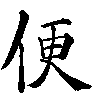
Video: Writing and pronunciation
Printed form: 便
Readings: ベン BEN
Meaning: convenience
Mnemonic:
If a person イ can change 更, it's convenient.
Usage Examples:
便利 (べんり) convenient
便所 (べんじょ) toilet
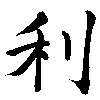
Video: Writing and pronunciation
Printed form: 利
Readings: リ RI
Meaning: profit; effective
Mnemonic:
Rice plants 禾 harvested with sickle which looks like リ.
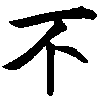
Video: Writing and pronunciation
Printed form: 不
Readings: フ FU
Meaning: un-
Mnemonic:
Stillborn baby 小 buried under the ground.
Usage Examples:
不便 (ふべん) inconvenient
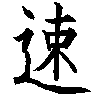
Video: Writing and pronunciation
Printed form: 速
Readings: はや (い) haya
Meaning: speedy
Mnemonic:
束 bundle of things and the radical for advance movement. [送 (おく) "to send"; 近 (ちか) "near"; 道 (みち) "street"]
Usage Examples:
速い (はやい) speedy
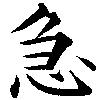
Video: Writing and pronunciation
Printed form: 急
Readings: いそ (ぐ) iso
Meaning: to hurry; quick
Mnemonic:
A mouth wide open (top); hand (middle); and heart (bottom). When you are in a hurry, you put your hand on your chest with your mouth wide open. [思 (おも) "to think"]
Usage Examples:
急ぐ (いそぐ) hurry
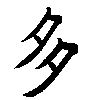
Video: Writing and pronunciation
Printed form: 多
Readings: おお (い) oo
Meaning: plenty
Mnemonic:
Many moons タ ago... [名 (な) "name"]
Usage Examples:
多い (おおい) plenty
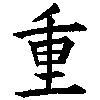
Video: Writing and pronunciation
Printed form: 重
Readings: おも (い) omo
Meaning: heavy
Mnemonic:
Car 車 with extra strokes on top and bottom is heavier.
Usage Examples:
重い (おもい) heavy

Video: Writing and pronunciation
Printed form: 平
Readings: ヘイ HEI
Meaning: flat; peace
Mnemonic:
A perfectly symmetrical design.
Usage Examples:
平成 (へいせい) Heisei era
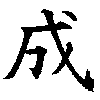
Video: Writing and pronunciation
Printed form: 成
Readings: セイ/なり SEI/nari
Meaning: emerge; bring out
Mnemonic:
Combination of soldiers' spears 戈 and 10,000 万 men.
Usage Examples:
成田 (なりた) Narita (city)
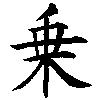
Video: Writing and pronunciation
Printed form: 乗
Readings: の (る)/ジョウ no/JOO
Meaning: to ride; to get on
Mnemonic:
A Christmas tree 木 decorated with pretty ornaments.
Usage Examples:
乗る (のる) ride
乗車けん (じょうしゃけん) passenger ticket
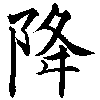
Video: Writing and pronunciation
Printed form: 降
Readings: お (りる) o
Meaning: to descend
Mnemonic:
This institution 院 has changed 変 a lot over the years 年.
Usage Examples:
降りる get off
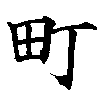
Video: Writing and pronunciation
Printed form: 町
Readings: まち/チョウ machi/CHOO
Meaning: town
Mnemonic:
Rice field 田 surveyed and marked by stakes 丁.
Usage Examples:
町 (まち) town
中西町 (なかにしちょう) Town of Nakanishi
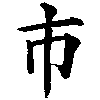
Video: Writing and pronunciation
Printed form: 市
Readings: シ SHI
Meaning: city
Mnemonic:
A picture of a market building. 巾 is the kanji for "cloth". [姉 (あね) "older sister"]
Usage Examples:
成田市 (なりたし) Narita City
名古屋市 (なごやし) Nagoya City
市内 (しない) within the city
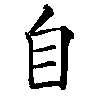
Video: Writing and pronunciation
Printed form: 自
Readings: ジ I
Meaning: self
Mnemonic:
A picture of a person's nose. Japanese point at their nose as they say, "It's me!"
Usage Examples:
自分で (じぶんで) by oneself
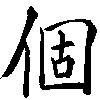
Video: Writing and pronunciation
Printed form: 個
Readings: コ KO
Meaning: piece(s)
Mnemonic:
Person イ and solid 固 (like an aged 古 lump of cheese 口).
Usage Examples:
一個 (いっこ) one piece

Video: Writing and pronunciation
Printed form: 心
Readings: シン / こころ SIN / kokoro
Meaning: mind; core; heart; soul
Usage Examples:
心ぞう (しんぞう) heart
決心する (けっしんする) decide
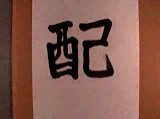
Video: Writing and pronunciation
Printed form: 配
Readings: パイ、ハイ PAI, HAI
Meaning: distribute
Usage Examples:
心配する (しんぱいする) to worry
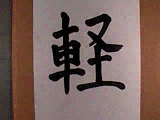
Video: Writing and pronunciation
Printed form: 軽
Readings: ケイ/ かる (い) KEI/ karu(i)
Meaning: light; slight; easy
Usage Examples:
軽い物 (かるいもの) something light
口が軽い人 (くちがかるいひと) a gossipmonger
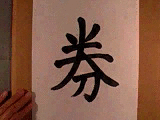
Video: Writing and pronunciation
Printed form: 券
Readings: ケン ken
Meaning: ticket
Usage Examples:
乗車券 (じょうしゃけん) passenger ticket
特急券 (とっきゅうけん) special express ticket
食事券 (しょくじけん) meal ticket
New Readings
| KANJI | READINGS |
|---|---|
| 都内 | (とない), within the city of Tokyo |
| 少ない | (すくない), few; little |
| 変える | (かえる), change something |
| 間に合う | (まにあう), be on time |
| 学会 | (がっかい), academic organization |
| 話 | (はなし), story; talk |
| 通う | (かよう), commute |
[Quizzes (JavaScript required): Meaning (27 questions) | Reading (23 questions)]
